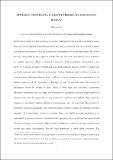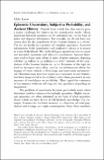Files in this item
Epistemic uncertainty, subjective probability, and ancient history
Item metadata
| dc.contributor.author | Lavan, Myles Patrick | |
| dc.date.accessioned | 2019-05-24T16:30:04Z | |
| dc.date.available | 2019-05-24T16:30:04Z | |
| dc.date.issued | 2019-07 | |
| dc.identifier | 253211065 | |
| dc.identifier | 1e634f32-ac30-41ce-9dff-9b60298ca4fe | |
| dc.identifier | 85066139940 | |
| dc.identifier | 000472919100005 | |
| dc.identifier.citation | Lavan , M P 2019 , ' Epistemic uncertainty, subjective probability, and ancient history ' , Journal of Interdisciplinary History , vol. 50 , no. 1 , pp. 91-111 . https://doi.org/10.1162/jinh_a_01377 | en |
| dc.identifier.issn | 0022-1953 | |
| dc.identifier.other | ORCID: /0000-0001-8290-7893/work/60195930 | |
| dc.identifier.uri | https://hdl.handle.net/10023/17759 | |
| dc.description.abstract | The subjective interpretation of probability—increasingly influential in other fields—makes probability a useful tool of historical analysis. It provides a framework that can accommodate the significant epistemic uncertainty involved in estimating historical quantities, especially (but not only) regarding periods for which we have limited data. Conceptualizing uncertainty in terms of probability distributions is a useful discipline because it forces historians to consider the degree of uncertainty as well as to identify a most-likely value. It becomes even more useful when multiple uncertain quantities are combined in a single analysis, a common occurrence in ancient history. Though it may appear a radical departure from current practice, it builds upon a probabilism that is already latent in historical reasoning. Most estimates of quantities in ancient history are implicit expressions of probability distributions, insofar as they represent the value judged to be most likely, given the available evidence. But the traditional point-estimate approach leaves historians’ beliefs about the likelihood of other possible values unclear or unexamined. | |
| dc.format.extent | 292003 | |
| dc.format.extent | 230144 | |
| dc.language.iso | eng | |
| dc.relation.ispartof | Journal of Interdisciplinary History | en |
| dc.subject | D051 Ancient History | en |
| dc.subject | T-NDAS | en |
| dc.subject | BDC | en |
| dc.subject | R2C | en |
| dc.subject.lcc | D051 | en |
| dc.title | Epistemic uncertainty, subjective probability, and ancient history | en |
| dc.type | Journal article | en |
| dc.contributor.sponsor | Arts and Humanities Research Council | en |
| dc.contributor.institution | University of St Andrews. School of Classics | en |
| dc.contributor.institution | University of St Andrews. Centre for the Literatures of the Roman Empire | en |
| dc.contributor.institution | University of St Andrews. Institute of Legal and Constitutional Research | en |
| dc.identifier.doi | https://doi.org/10.1162/jinh_a_01377 | |
| dc.description.status | Peer reviewed | en |
| dc.date.embargoedUntil | 2019-11-23 | |
| dc.identifier.grantnumber | AH/P004571/1 | en |
This item appears in the following Collection(s)
Items in the St Andrews Research Repository are protected by copyright, with all rights reserved, unless otherwise indicated.


